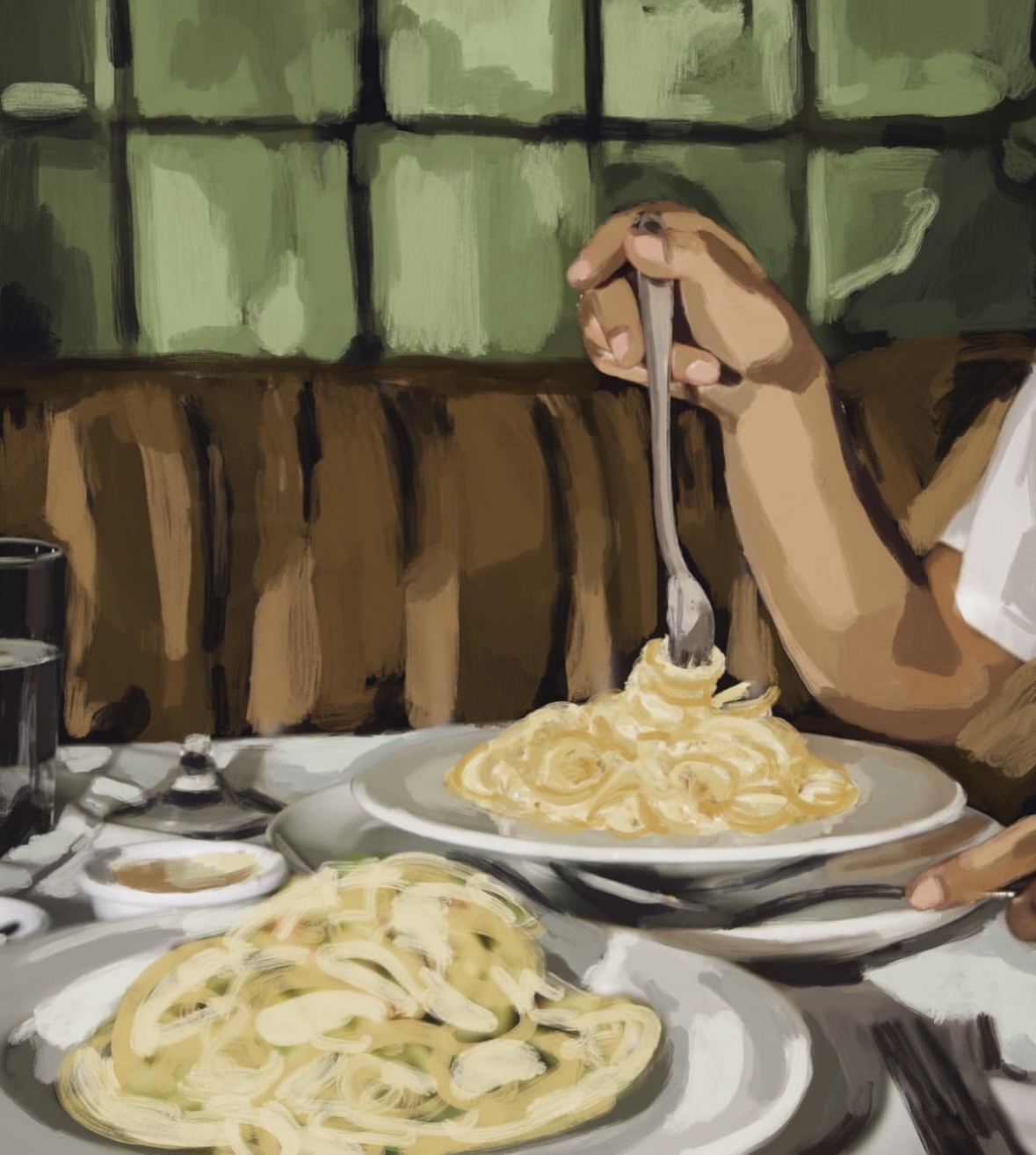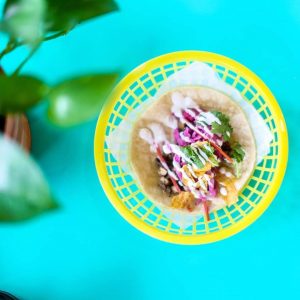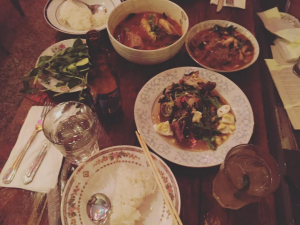On Thursday, Jan. 18, a mysterious email arrived in our inbox: “Georgetown’s First-Ever Pasta Bar.” Huh? Sent from the inconspicuous Georgetown address of Jacopo Cardinali (MSB ’25), the pasta bar email reached hundreds of people. Our interest was immediately piqued; it was all we could talk about before our weekly section meeting. We had so many questions. Who are these people? Why are they cooking pasta? Is it any good? How on earth did they get so many email addresses?
Equal parts intrigued and ravenous, we shot the organizers an Instagram DM looking for some answers and, hopefully, a meal. We expected to stop by the Arrupe Kitchen—their usual headquarters—to witness their normal operations the following Friday; two hours later, we received an invite to their home for a private tasting.
With jagged cobblestone steps leading to the front door, their townhouse was unequivocally Georgetown. Untied shoes haphazardly littered the entryway. Close friends were exchanging playful banter. In place of sophisticated seating sat a lumpy bean bag. We had stepped into an environment that was so college. Relaxed by this comforting and disarming aura, we were quick to assume that their dishes would mimic this laid-back energy. Yet, as we met the founders of Dai Tre Fratelli, it was abundantly clear that this pasta bar was more than just a half-hearted side hustle.
Though their name translates to “from the three brothers,” Dai Tre Fratelli has four masterminds at work; the name was originally chosen to reference the founders—Cardinali, Dragan Wilms (MSB ’25), and Marcelo Gigliani Alcantarilla (MSB ’25)—before the addition of Jasper Shi (MSB ’24). Head chefs Cardinali and Wilms lead the kitchen, with the former having grown up in Sicily and the latter having roots in Monaco, Germany, and Singapore. The other two, Alcantarilla and Shi, shore up the backend, handling the finances to keep things running smoothly. Despite not growing up with any direct Italian influences, the two also come from extensive international backgrounds (Madrid and Vancouver/Beijing respectively) and share the head chefs’ appreciation for a good bowl of pasta. All four members started Dai Tre Fratelli hoping to bring some sense of home—and some better quality food—to Georgetown’s campus.
It started out with a text from Wilms to Cardinali. “Okay, you know how Georgetown students don’t really have a good alternative for Italian food to Leo’s? And how Leo’s is a bit, um, not the best?”
Beginning as two friends poking fun at the campus dining hall became a full-fledged business idea. “What we want to bring are these homey dishes and for them to be cost effective to students,” Cardinali explained. With each dish averaging out to about $12, Dai Tre Fratelli’s dishes prove to be much cheaper than local Georgetown restaurants; the average pasta dish at Il Canale costs $22.
Before the door could even fully shut behind us, the guys led us to their dining room, adorned with wrapped silverware, Italian sodas, and most importantly: plates on plates of pasta.
Placed in the very center of the table was their signature cacio e pepe. This dish is not your typical cream-coated Olive Garden Alfredo or Kraft Mac & Cheese. The spaghetti is cooked al dente, then topped with a generous amount of black pepper and freshly shaved pecorino romano, a classic Italian sheep milk cheese. A splash of pasta water is added in and tossed with the pasta, incorporating the starch needed to help the cheese emulsify, culminating in a fragrant creamy sauce. The flavor profile is delectably rich without being overwhelming; the pepper’s crackle on the tongue brings a welcome contrast to the salty cheese base.
The decadent dish is wholly comforting but not one bit too heavy. Originating from Rome, cacio e pepe literally means “cheese and pepper.” The dish is simple, but as Wilms explained, the key to its taste is the quality of the ingredients, a point of pride for the guys at Dai Tre Fratelli.
“We spend a lot on ingredients. A lot of it is imported and we make sure everything’s sourced really well, because we believe that that is what brings out the good taste,” Wilms said. “A lot of restaurants in the area, I think, cheap out on the stuff they put in their pasta. For us who grew up eating it, we can really tell. It’s the little stuff, like the oil, like the cheese, that can really make the difference.”
In case we weren’t convinced, Wilms ducked into the kitchen and re-emerged with a 10-inch cheese wheel—genuine Pecorino Romano imported straight from Florence. We had to take a minute to decipher the label, written entirely in Italian (we don’t know any Italian). Nevertheless, the guys didn’t need a cheese wheel to convince us their dishes were authentically Italian; the food spoke for itself.
The guys truly lean into their Italian influence with their paccheri alla norma. Not an Italian dish that most Americans are familiar with, Fratelli’s paccheri alla norma features a flat, tube-like noodle that serves as a sponge to soak up their homemade pomodoro sauce. Paired with a perfectly roasted eggplant, this dish is a flawless blend of spritely flavor and sinking heartiness. The smokiness of the eggplant and the richness of the burrata coat your tongue with bursts of flavor, but the pomodoro sauce’s acidity cuts through its creaminess and keeps it from weighing you down, allowing us to completely demolish this dish with no regrets.
Perhaps the most notable aspect of the paccheri alla norma is its hominess. At first bite, the dish wrapped us in a warm hug, luring us into an unforeseen sense of comfort. This remarkable nostalgia is Dai Tre Fratelli’s ultimate goal.
“There are those moments, like, once a semester, twice a semester, where I really miss the food from home that my family makes. Yes, you can go to a restaurant, but sometimes it’s not as good as I remember. Now that I’m in my junior year, taking a little bit less credits, I feel like I have the time to give back to other students … We think we can help people fill this void while they’re here,” Cardinali explained to us.
The final dish we tried was penne alla vodka, the more authentic cousin to the infamous Gigi Hadid quarantine pasta. Fratelli’s version of the dish skimps on the usual load of heavy cream and instead doubles down on the booze to create a surprisingly refreshing effect. Tangy and remarkably bright, the flavors call to imagination a lounge by the sea on a warm day, soaking in the sun with a cool drink in hand.
The chefs explained that the vodka enhances the tomatoes’ natural citric acidity, placing its tart flavor at center stage. Shi mentioned that they tried experimenting with the conventional method by swapping in other liquors, but found limited success. “From a chemical perspective, it brings out the extra taste of the tomatoes. And it really does matter. I’ve used rum before and, you know, tequila. It’s not very good,” Shi remarked.
Although their first rounds of testing championed tradition, the guys are eager to incorporate more creativity into future iterations of their menu—in particular, they are interested in adding ingredients from other cuisines. The table buzzed with excitement as they envisioned zucchini puree, pistachio pesto, creamy miso, and homemade ravioli.
“We want to be ourselves. We’re thinking of, like, something more untraditional and spiced. We want to be proud of ourselves and our creativity. Obviously, we have to keep it classic at the beginning, but when we gain a little bit more reputation and trust from our customers, we definitely want to try some things that are a little bit more out there” said Wilms.
While all the guys were more than excited to discuss their future business endeavors, they were not ones to shy away from the difficulties they faced, particularly eager to poke fun at their first attempt at community outreach. With no school-wide directory at their disposal, they turned to the next best thing: Tombs night email lists.
“We got a list of like, 800 or something people for the first email we sent. We looked through every single Tombs night invite we had ever gotten and just copy and pasted everyone. Thank God they didn’t B.C.C. any of us,” said Gigliani Alcantarilla.
The challenges didn’t stop there. Jasper pointed out how sending the email proved to be a struggle in and of itself. “It’s a funny story. We [first] sent it out from our very corporate Gmail and got about 900 replies from the system that it didn’t go through. So our phones were blowing up for like a good hour. And we sent that email three times? Three times, to really make sure. So, marketing is definitely a work in progress.”
Outreach wasn’t the only hoop the guys had to jump through; there were significant growing pains as the team tried to cook and sell their pasta. An unprecedented snowstorm in D.C. complicated Fratelli’s original idea of an outdoor event where Georgetown students could bond over their love of food while simultaneously getting to know the creative minds behind Dai Tre Fratelli. This snowstorm shrank Fratelli’s team from four to two, with half the team being stuck at home, unable to get to campus.
As the snowstorm raged throughout Georgetown, many students were (understandably) unwilling to wait outside for some pasta they had never heard of, much less tasted. Needless to say, turnout was low and morale was even lower. Yet, despite the gauntlet of challenges thrown at them, Shi explains how the Dai Tre Fratelli team worked through every single one with grace, treating each as an opportunity for learning.
“I’m an entrepreneurship minor, Marcelo and I. We’re both taking these classes. So, you know, it’s gotten the juices flowing. But through this experience, a lot of the things that we learned, we actually get to use. And that’s super cool. All the pivoting, all the different concepts. Nothing you can learn [in] a classroom compares to doing everything yourself and fucking it up a million times until you get it right.”
Although Dai Tre Fratelli has faced their fair share of trials and tribulations—consisting of lengthy conversations around sourcing ingredients, scouring Tombs night invite lists to get their name out, and cooking pasta in the snow—they have not been deterred from pursuing their initial goal: to warm the hearts (and bellies) of Georgetown students.
As Dai Tre Fratelli has developed from a cool idea to a fully-fledged venture, the name has taken on additional meaning as a tribute to friendships deepened by their shared culinary passion. Our dinner with Fratelli was soundtracked by infectious laughter that infiltrated every corner of the dining room, with all the guys urging us to take food home and share it with our friends. Leaving their townhouse, one thing was clear: there is so much heart behind Dai Tre Fratelli. Hosting an in-person pasta bar event every Friday isn’t easy, but the gratification of seeing their impact within the student body is more than enough to make up for it.
“These Thursday nights and Friday days are really heavy, but when you’re speaking with people and you see that they enjoy your food and, like, people are speaking about it on campus, it does bring satisfaction. It’s a very good feeling.” said Cardinali.
At its core, Dai Tre Fratelli is a labor of love made with Georgetown students in mind. So, as you attempt to decide between Leo’s and Epi’s, stop by the Arrupe Kitchen on Fridays from 12 p.m. for some wholesome home-cooked meals that’ll leave you feeling warm and fuzzy.
Editor’s note: The printed version of this article that appears in our March 1 issue includes an incorrect spelling of Shi’s name. This online version reflects the correct spelling.





